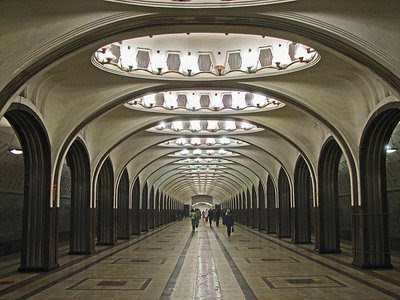These are just ten stations of the best looking subway system in the world. The hardest task was to select only ten of them. There are many more equally beautiful stations in the Moscow Metro system, this is just a peak view. For more just go to flickr.com and search for "moscow metro station".
WidgetBucks - Trend Watch - WidgetBucks.com
Mayakovskaya

CC
 CC
CCMayakovskaya is a the most famous station on the Zamoskvoretskaya Line of the Moscow Metro. Considered to be one of the most beautiful in the system, it is one of the finest examples of pre-World War II Stalinist Architecture making it one of the most famous Metro stations in the world.
Prospekt Mira CC
CC
CCProspekt Mira (Avenue of Peace) is a station on the Kaluzhsko-Rizhskaya Line of the Moscow Metro. It was opened on May 1, 1958. The station features flared pylons faced with white marble and trimmed with sharp-edged metal cornices. The walls are faced with off-white ceramic tile with horizontal black stripes. Between 1958 and until 1971 the station was a terminus of the Rizhskaya Line. The entrance to the station is located on the west side of Prospekt Mira (north of Protopopovsky Pereulok) in the ground floor of the Metro's central control building.
Arbatskaya CC
CC CC
CCArbatskaya is a station on the Arbatsko-Pokrovskaya Line of the Moscow Metro. Along with Smolenskaya and Kievskaya, it was built in 1953 to replace an older, parallel section of track which has since become part of the Filyovskaya Line. The old station had been damaged in a German bomb attack in 1941, so its replacement was much deeper and included larger stations that could double as shelters. Although it was initially supposed to be closed permanently, the old section was reopened five years later.
Kievskaya CC
CC CC
CCKievskaya is a station on the Koltsevaya Line of the Moscow Metro. It is named for the nearby Kievsky Rail Terminal. The design for the station was chosen in an open competition held in the Ukraine. Kievskaya features low, square pylons faced with white marble and surmounted by large mosaics, celebrating Russo-Ukrainian unity. Both the mosaics and the arches between the pylons are edged with elaborate gold-colored trim. At the end of the platform is a portrait of Lenin.
Krasnopresnenskaya

CC

CCKrasnopresnenskaya is a station on the Koltsevaya Line of the Moscow Metro. It was opened on March 14, 1954. The station has red granite pylons with white marble cornices and 14 bas-reliefs. Eight of the bas-reliefs depict the events of the Russian Revolution of 1905 and the other six show scenes from the Russian Revolution of 1917. Statues of Lenin and Stalin originally stood at the end of the platform, though these had been removed by the early 1960s.
WidgetBucks - Trend Watch - WidgetBucks.com
Komsomolskaya

CC

CCKomsomolskaya is a station on the Koltsevaya Line of the Moscow Metro, arguably the most opulent in a system known for its palatial stations. The station's most noticeable feature is its grandiose Baroque-style ceiling, which is painted pale yellow and encrusted with mosaics and floral moldings. The ceiling is supported by 68 octagonal white marble columns with modified Ionic capitals. Komsomolskaya opened on January 30, 1952.
The artistic theme of the station is Russia's fight for independence and historical struggles against invaders. In keeping with this theme are the eight large mosaics along the center of the ceiling. At the end of the platform are a bust of Lenin and an arch decorated with gilt floral designs and the Soviet coat of arms. The station's vestibule is built on a grand scale as well, with an immense octagonal dome, cupola, and spire and imposing full-height portico with stylized Corinthian columns.
Novoslobodskaya
 CC
CC CC
CCNovoslobodskaya is a station on the Koltsevaya Line of the Moscow Metro. It is best known for its 32 stained glass panels. Each panel, surrounded by an elaborate brass border, is set into one of the station's pylons and illuminated from within. Both the pylons and the pointed arches between them are faced with pinkish Ural marble and edged with brass molding. At the end of the platform is a mosaic by Pavel Korin entitled "Peace Throughout the World."
The vestibule is an imposing structure with a grand portico, located on the northeast corner of Novoslobodskaya Ulitsa and Seleznevskaya Ulitsa.
Elektrozavodskaya CC
CC CC
CCElektrozavodskaya (Electric Factory), located on the Arbatsko-Pokrovskaya Line, is one of the more spectacular and better-known stations on the Moscow Metro. Aptly named for a nearby power plant, Elektrozavodskaya's defining feature is the ceiling, which is almost completely covered by six rows of circular incandescent inset lamps- 318 in all. In keeping with the electrical theme, the inside of the vestibule is decorated with portraits of pioneers in electricity and electrical engineering. The platform is relatively short, with only six white marble pylons on each side. The inward-facing sides of the pylons are decorated with bas-reliefs depicting the Soviet Union’s industrial and agricultural workers. The outside faces have sconces and decorative metal grilles depicting the hammer and sickle. Elektrozavodskaya opened in 1944.
Belorusskaya CC
CC CC
CCBelorusskaya is a station on the Moscow Metro's Koltsevaya Line. It is named for the nearby Belarus rail terminal. It opened in 1952, serving briefly as the terminus of the line before the circle was completed in 1954. The station has low, white marble pylons, an elaborately patterned plaster ceiling, light fixtures supported by ornate scroll-shaped brackets, and a variety of decorations based on Belarusian themes. Overhead, twelve octagonal mosaics depict Belarusian daily life, and underfoot the platform is intricately tiled to resemble a Belarusian quilt. A sculptural group called "Soviet Belorussia" used to stand at the end of the platform before it was removed in 1998 to make room for a second entrance. Another sculptural group, "Belarusian Partisans," is located in the passage between this station and Belorusskaya-Radialnaya.
Taganskaya
 CC
CC CC
CCTaganskaya is a station on the Koltsevaya Line of the Moscow Metro. It was opened on January 1, 1950. The station is decorated with fourteen large triangular majolica panels which include cameo portraits of heroes of the Red Army as well as intricate floral designs. The panels facing the centre of the station are coloured pale blue while those facing outwards are untinted. There was originally a marble bas-relief at the end of the platform depicting Stalin surrounded by an adoring throng, but this was torn out in 1966 when the passage to Taganskaya-Radialnaya was built. Another artwork in the station is a circular ceiling panel entitled "Victory Salute" located in the intermediate hall between the two sets of escalators.
WidgetBucks - Trend Watch - WidgetBucks.com
Most of the text is a stripped down version of the stations descriptions on Wikipedia.
All of the photographs are licensed under Creative Commons.


















































